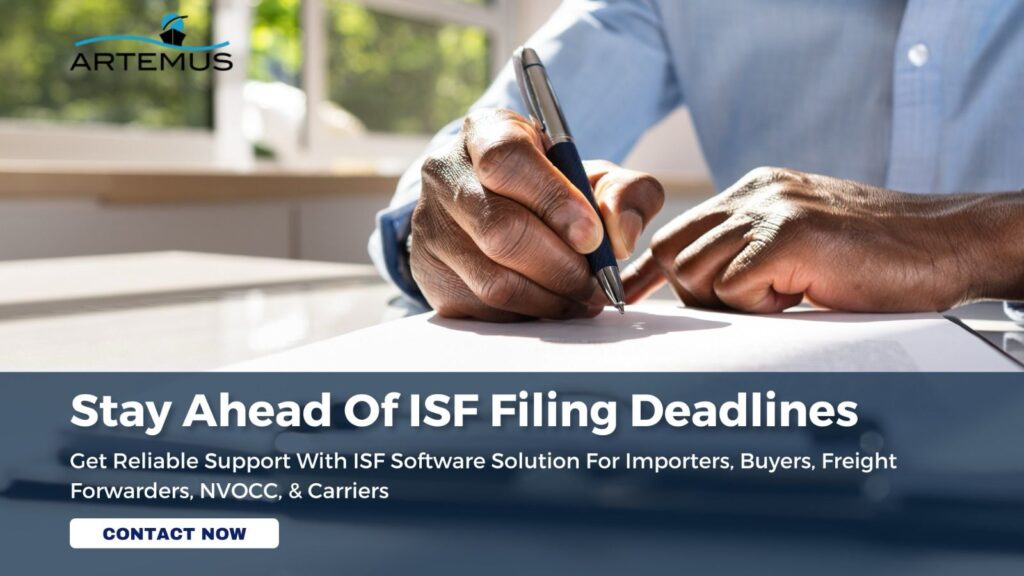
What Is Inbound Logistics & Outbound Logistics? A 2025 Guide
In the dynamic world of supply chain management, understanding the nuances of inbound and outbound logistics is crucial for operational

Embarking on a career as a freight broker can be an exciting venture into the world of logistics and transportation. However, like any profession, it comes with its set of requirements and costs, one of which is obtaining a freight broker license.
Understanding the intricacies of these costs is crucial for anyone considering entering this field. This guide offers practical tips to streamline the licensing process and save money.
Additionally, Artemus Transportation Solutions provides a tailored software solution for ISF and AMS filings. This user-friendly platform automates filing processes, ensuring compliance and reducing costs related to errors and delays.
Table Of Contents
Understanding the breakdown of freight broker license costs is crucial for individuals or businesses considering entering the transportation industry.
While the specific expenses can vary depending on factors such as location, business structure, and compliance requirements, here’s a general breakdown of the typical costs involved in obtaining a freight broker license:
This fee is paid to the Federal Motor Carrier Safety Administration (FMCSA) or relevant licensing authority to cover the administrative costs of processing your license application. The exact amount varies but typically falls within the range of $300 to $1,000.
As part of the licensing requirements, freight brokers must obtain a surety bond or establish a trust fund. This bond serves as financial security and ensures that brokers fulfill their obligations to carriers and shippers.
The bond amount is set by the FMCSA and is currently $75,000. The cost of the bond, also known as the premium, depends on factors such as credit history and financial stability, but it typically ranges from $500 to $2,000 annually.
Freight brokers operating in the United States are required to designate a process agent in each state where they do business. This agent is responsible for receiving legal documents on behalf of the broker.
The fee for appointing a process agent varies depending on the service provider and the number of states in which the broker operates. On average, this fee can range from $50 to $200 per state per year.
Freight broker licenses must be renewed every two years to maintain compliance with regulatory requirements.
The renewal fee is typically similar to the initial application fee and ranges from $300 to $1,000. Failure to renew the license on time may result in penalties or suspension of operations.
In addition to the above-mentioned expenses, there are several miscellaneous costs associated with obtaining a freight broker license.
These may include background checks, training courses, legal fees for contract drafting, insurance premiums, and office setup costs. While these costs can vary widely depending on individual circumstances, budgeting an additional $500 to $2,000 for miscellaneous expenses is advisable.
Related: How To Get A Freight Broker License?
Several factors can influence the overall cost of obtaining a freight broker license. Understanding these factors is essential for individuals or businesses planning to enter the transportation industry as licensed brokers.
Here are some key factors that can affect license costs:
The structure of your brokerage business can significantly impact license costs. Whether you operate as a sole proprietorship, limited liability company (LLC), or corporation, each business structure has its own associated costs.
For example, forming an LLC or corporation typically involves registration fees with the state, annual report fees, and possibly legal consultation fees. These costs can vary depending on the state and the complexity of the business structure chosen.
Prior experience and training in the transportation industry can influence license costs. Individuals with extensive industry knowledge and relevant experience may require less training and preparation to obtain a freight broker license, potentially reducing associated costs.
On the other hand, those with limited experience may need to invest more time and resources in training programs, courses, or educational materials to meet licensing requirements.
The state(s) in which you plan to operate as a freight broker can impact license costs. While obtaining a federal freight broker license from the Federal Motor Carrier Safety Administration (FMCSA) is required nationwide, some states have additional licensing or registration requirements for brokers operating within their jurisdictions.
These state-specific requirements may include additional fees, bonding or insurance obligations, or regulatory compliance measures, thereby increasing overall license costs.
Meeting regulatory compliance and insurance requirements is a fundamental aspect of obtaining a freight broker license. Compliance obligations, such as maintaining a surety bond, liability insurance, and cargo insurance, can incur significant costs.
The cost of insurance premiums, bonding fees, and other compliance-related expenses can vary based on factors such as coverage limits, deductibles, and the broker’s risk profile.
The scale and scope of your brokerage operations can also influence license costs. Larger brokerages with a high volume of shipments and a broader geographic reach may incur higher licensing fees, insurance premiums, and bonding costs compared to smaller or startup brokerages.
Additionally, expanding into new markets or offering specialized services may entail additional expenses related to compliance, marketing, and operational infrastructure.
Seeking legal or consulting services to navigate the licensing process and ensure compliance with regulatory requirements can incur additional costs. Legal fees for reviewing contracts, drafting agreements, or providing regulatory guidance can vary depending on the complexity of the services required and the expertise of the professionals involved.
By considering these factors and conducting thorough research and planning, individuals or businesses can better estimate and budget for the total cost of obtaining a freight broker license.
Additionally, consulting with industry experts or legal professionals can provide valuable insights and guidance to navigate the licensing process efficiently and cost-effectively.
Related: How To Become A Freight Broker With No Experience?
Reducing freight broker license costs is a goal for many individuals and businesses entering the transportation industry. While there are certain mandatory expenses associated with obtaining a license, there are also strategies and tips that can help minimize these costs.
Here are some valuable tips to reduce freight broker license costs:
Before diving into the licensing process, take the time to research and understand the various costs involved. Create a detailed budget that includes all potential expenses, such as application fees, bonding costs, and ongoing compliance expenses.
By planning ahead and budgeting carefully, you can avoid unexpected financial burdens and allocate resources efficiently.
Consider the most cost-effective business structure for your brokerage operation. While forming a corporation or LLC may offer certain advantages in terms of liability protection and tax benefits, it can also entail higher registration and maintenance costs compared to operating as a sole proprietorship.
Evaluate the pros and cons of each business structure to determine the best option for your specific needs and budget.
Utilize free resources and educational materials available online to supplement your training and preparation for the licensing process. There are numerous websites, forums, and industry publications that offer valuable insights, guides, and templates related to freight brokerage.
By leveraging these resources, you can reduce the need for costly training programs or consulting services.
Look for opportunities to bundle services and streamline your operations to reduce costs. For example, some insurance providers may offer discounts or package deals for combining liability, cargo, and bond insurance coverage. Similarly, consider bundling compliance services, such as process agent representation or regulatory consulting, to negotiate lower rates and save on overall expenses.
Don’t settle for the first quote you receive when purchasing surety bonds or insurance coverage. Shop around and compare rates from multiple providers to ensure you’re getting the best value for your money.
Be sure to consider factors such as coverage limits, deductibles, and terms and conditions when evaluating different options. Additionally, inquire about any available discounts or incentives for new customers or bulk purchases.
Invest in technology and software solutions that can help streamline your brokerage operations and reduce administrative costs. Automated freight management systems, accounting software, and customer relationship management (CRM) tools can increase efficiency, minimize manual tasks, and ultimately save you time and money.
Look for software providers that offer flexible pricing plans or free trials to test out their products before committing to a purchase.
Don’t hesitate to negotiate terms and pricing with service providers, such as process agents, insurance brokers, or compliance consultants. Many providers are willing to offer discounts or flexible payment options to attract new clients or retain existing ones.
Negotiate payment schedules, request volume discounts, or explore alternative fee structures to reduce your overall expenses without sacrificing quality or service.
Related: What Is Freight Forwarder Vs Broker: 6 Key Differences
Investing in a freight broker license can be a strategic move for individuals or businesses looking to enter the transportation industry or expand their existing operations. While acquiring a freight broker license involves some initial costs and effort, the benefits it brings can far outweigh the investment.
Here are some compelling reasons why investing in a freight broker license can be advantageous:
Holding a freight broker license signals to clients, carriers, and regulatory authorities that you are a legitimate and professional player in the transportation industry. It demonstrates your commitment to adhering to industry standards and regulations, which can instill trust and confidence in your services.
With a freight broker license, you can negotiate directly with carriers and leverage your position to secure competitive rates for your clients. Licensed brokers often have access to a wider network of carriers and can tap into preferential pricing arrangements, ultimately providing cost-saving opportunities for shippers.
The transportation industry is heavily regulated, and operating as an unlicensed broker can expose you to legal risks and penalties. By obtaining a freight broker license, you ensure compliance with federal and state regulations, including bonding requirements, insurance obligations, and record-keeping standards.
This not only protects your business from legal liabilities but also fosters a reputation for operating ethically and responsibly.
Holding a freight broker license opens doors to a range of business opportunities within the logistics and supply chain ecosystem. You can act as an intermediary between shippers and carriers across various industries, facilitating the movement of goods and optimizing transportation logistics.
Additionally, licensed brokers may qualify for contracts with larger corporations and government agencies that require their partners to be properly licensed and insured.
With the ability to negotiate favorable rates and provide value-added services, licensed freight brokers can maximize their earning potential. By charging competitive commissions or service fees for arranging shipments, brokers can generate a steady stream of income while helping clients streamline their freight operations and reduce costs.
Moreover, the scalability of the brokerage business allows for growth opportunities and the potential to expand into new markets or service offerings.
Obtaining a freight broker license often involves completing mandatory training programs or courses to gain industry knowledge and skills. This educational investment not only prepares you for the responsibilities of brokerage but also provides opportunities for professional development and networking.
Engaging with industry associations, attending conferences, and participating in training seminars can help you stay informed about industry trends, regulations, and best practices, ultimately enhancing your credibility and competitiveness as a broker.
Related: What Is A Freight Broker & How Do They Work In 2024?

Artemus Transportation Solutions offers a comprehensive freight broker software solution tailored specifically for ISF (Importer Security Filing) and AMS (Automated Manifest System) filings.
With Artemus, freight brokers gain access to a user-friendly platform equipped with advanced features and automation tools to streamline the filing process, ensure compliance with customs regulations, and enhance operational efficiency.
By leveraging Artemus’ software, freight brokers can efficiently manage ISF and AMS filings, reduce manual errors, and expedite customs clearance, ultimately improving productivity and customer satisfaction.
Related: How To Choose A Freight Forwarder? 10 Critical Aspects
Yes, you can potentially make a lot of money as a freight broker by earning commissions on each freight shipment brokered, which can be lucrative depending on your client base, negotiation skills, and market conditions.
The highest-paid freight typically includes specialized cargo such as hazardous materials, oversized loads, and time-sensitive shipments, which command premium rates due to their unique handling requirements and delivery urgency.
To find clients as a freight broker, utilize networking with shippers and carriers, leverage online platforms and directories, and offer competitive pricing and exceptional service to attract and retain customers.
To start a freight agency, begin by obtaining relevant licenses and permits, establishing relationships with carriers and shippers, and creating a business plan outlining your services, target market, and financial projections.

In wrapping up our exploration of freight broker license costs, it’s clear that while there are indeed financial investments involved, the returns are plentiful and enduring. Acquiring a freight broker license isn’t just about ticking off regulatory boxes; it’s about positioning yourself as a trusted, credible partner in the intricate web of logistics.
Yes, there are application fees, surety bonds, and ongoing compliance expenses, but these are the building blocks of a solid foundation for your brokerage business.
Related: How To Become A Freight Forwarder: A Stepwise Guide

In the dynamic world of supply chain management, understanding the nuances of inbound and outbound logistics is crucial for operational

In today’s interconnected world, businesses rely heavily on global trade to expand their markets, access new resources, and drive growth.

Importing goods for resale in the USA presents a lucrative business opportunity, but navigating the complexities of U.S. customs regulations,
Get In Touch
Artemus’ Software Solutions for ISF, AMS, Japan AFR, eManifest Canada, & Panama B2B filings.